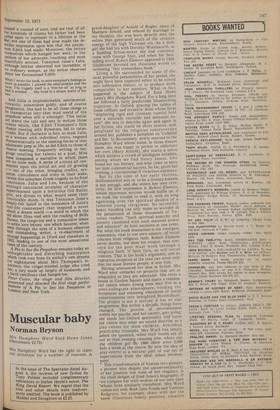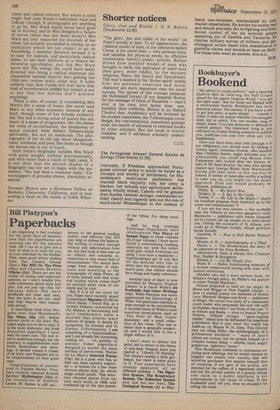Muscular baby
Norman Bryson
Airs Humphrey Ward Enid Huws Jones. (Heinemann £2.75) Mrs Humphrey Ward has the right to claim our attention for a number of reasons. A grand-daughter of Arnold of Rugby, niece of Matthew Arnold, and related by marriage to the Huxleys, she was born directly into the milieu that generated much of the creative energy of the high Victorian era, As a little girl she had tea with Dorothy Wordsworth, as a budding fiction-writer she had conversations with George Eliot, and when her bestselling novel Robert Elsmere appeared in 1888, Gladstone devoted ten thousand words to reviewing "this tremendous book.", Living a life surrounded by some of the most powerful personalities of her period, she might have been expected either to be cowed into submissive silence, or to produce work comparable to her mentors. What in fact happened is the subject of Enid Huws Jones's Mrs Humphrey Ward. For a long time she followed a fairly predictable bluestocking trajectory. At Oxford, gracing the tables of those celibate and eccentric dons whose faces "displaying rigid and constant control held over a naturally excitable and sensuous nature" she was to describe again and again in her fiction, she starts on short stories, and, perplexed by the religious controversies around her, publishes a pamphlet on 'Unbelief and Sin.' In Bloomsbury, newly married to the Humphry Ward whose name, in those distant times, she was happy to permit to obliterate her own (Mary Arnold), she starts a salon which attracts a crowd of intelligent notables, among whom we find Henry James, who found her too literary, and who came to envy her later commercial success. So far, given her training, a conventional if vivacious existence. But by the time of her early thirties, disillusionment sets in: to be a literary hostess is not enough, and she enters her own creativity. Its first expression is Robert Eismere, whose enormous success would baffle us, if we took the trouble to read it, with its long agonising over the spiritual doubts of a talented young clergyman. Its incredibly heavy handling can only make us wonder at the persistence of those thousands of Victorian readers: "Such spiritual anarchy and poverty combined with such material power and resource!" its hero exclaims at one point. But what the book dramatises is the emergent separation, vital to our own century, of social concern from religious faith. Robert Elsmere never doubts, nor does his creator, that concern for the poor must work through a religious faith. If faith fails, so will social concern. That is the book's argument, and its rapturous reception at the time can mean only that for most literate people, it was true.
Having announced her idea in fiction, Mrs
• Ward next embarks on projects that are as misguided as they are admirable. She rents a house in Gordon Square and starts a residential centre where young men may live in a semi-collegiate atmosphere, reading the Scriptures and releasing vibrations of social
consciousness into benighted Bloomsbury. The project is not a success: it has no real programme. But within a decade, things have, changed. The process of secularisation within her psyche, and her society, gets going: she sheds her Oxford spirituality and turns her centre into what we would describe as a play-centre for slum children. Arnoldian practicality triumphs. Mrs Ward has simply asked the question, when their mums are all out at their evening cleaning jobs, where can the children go? By 1900 there were 2,000 kids a week at the centre. By now the idea of play-centre is a natural part of our set of expectations from the ideal urban environment.
This transformation of hostess into pioneer, a pioneer who despite the unconventionality
• of her position lost none of her elegance, is the chief delight of Enid Jones's biography. If 'we compare her with women of our own time
'whose lives similarly transform, Mrs Ward comes out well. Both Jane Fonda and Vanessa Redgrave, for example, share with her the same illustrious family position, creative talent and radical concern. But where a cynic might find Jane Fonda's radicalism loud and tedious (though, if photographs are anything to go by, Mrs Ward would never have gone far in movies), and in Miss Redgrave a failure of nerve (what has she done lately?) Mrs Ward not only respected the decorum of her times, but actually succeeded in setting up an institution which we can expect to go on flourishing. I mention decorum because it is so easy for radicals, and particularly radical ladies, to use their platform as a chance for intensive ego-display, and this Mrs Ward never did. The energy she could have easily diverted into being a radical superstar she channelled instead directly into getting her child-care centres really under way. It looks unlikely that Jane Fonda, will ever leave that kind of reverberation behind her (which is not to say that her movies don't achieve anything).
There is also, of course, in considering Mrs Ward's life, a sense of waste. She never read Marx or any other economic theorist of any kind, though some of her friends evidently did, She had a strong sense of justice but not much of a sense of programme. Her life shows the crisis of secularisation, the beeakaway of social concern from Robert Elsmere-style spirituality, but not its resolution. The photographs of her in old age show disappointment, tiredness, and pain. She looks as though she knows she is out of touch.
Enid Jones's biography handles Mrs Ward with great insight, without sentimentality, and with more than a touch of high camp. It is not often that the second chapter of a biography has the wit to begin with the statement, "She had been a muscular baby." For worshippers of grandes dames, absolutely essential.
Norman Bryson was a Harkness Fellow at Berkeley University, California, and is now writing a book on the novels of Edith Wharton

































 Previous page
Previous page